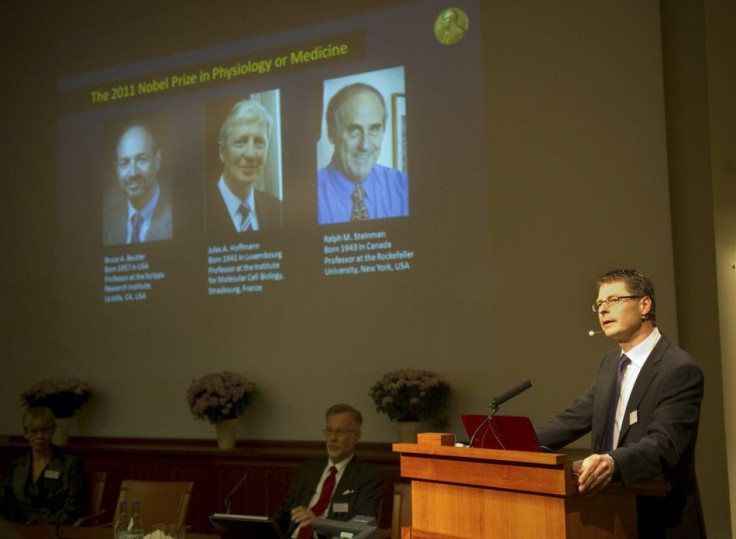Cancer Kills Nobel Physician Before Hears of Prize

A scientist who won the Nobel prize for medicine on Monday used his own discoveries to treat himself for cancer, but died of the disease just days before he could be told of the award.
Calling it bittersweet news, colleagues of Canadian-born Ralph Steinman at New York's Rockefeller University said he had prolonged his own life with a new therapy based on his prize-winning research into the body's immune system.
But the 68-year-old physician, who joked last week with his family about hanging on until the annual prize announcement, died on Friday after a four-year battle with pancreatic cancer.
He never knew his life's work had been crowned with the highest accolade science can bestow.
We wanted him to be here for this, said his daughter Alexis Steinman, 34. We were like 'OK Dad, I know things aren't going well but the Nobel, they are going to announce it next Monday'. And he's like: 'I know I have got to hold out for that. They don't give it to you if you have passed away.
'I got to hold out for that.'
Calling it a unique situation, Sweden's Nobel Committee was still considering how to reconcile the announcement with its policy of not making posthumous awards. It said it learned of Steinman's death two hours after declaring to the world that he would share the $1.5 million annual prize with American Bruce Beutler and Jules Hoffman from France.
It's really impossible to describe how our family is feeling right now. We're devastated to have lost Ralph, Steinman's son Adam told reporters in New York. We're so incredibly proud of dad for receiving this wonderful honor ... We know he will live on through his scientific contributions.
Steinman's research contributed to the launch last year of the first vaccine which is designed to kill tumors.
BITTERSWEET NEWS
Colleagues said Steinman was working until last week. Admitted to hospital on Sunday, he lost consciousness on Thursday and died surrounded by family the following day. But Rockefeller University president Marc Tessier-Lavigne said the university only heard of his death from the family about half an hour after news of the Nobel prize came out from Sweden.
In Stockholm, Nobel Committee secretary general Goran Hansson told Reuters that the poignant situation only became apparent there when his staff could not reach Steinman to tell him of the prize. It had been a closely guarded secret until announced by the Karolinska Institute at 11:30 a.m. (0930 GMT).
I am, of course, saddened that Dr Steinman could not receive this news and feel that happiness, Hansson said.
He was a great scientist.
His university said: Steinman ... was diagnosed with pancreatic cancer four years ago, and his life was extended using a dendritic-cell based immunotherapy of his own design.
Those cells, which the Montreal-born Steinman discovered in the 1970s, are key to the attack the body launches on tumors and infections if they breach its first line of immune defense.
The other prizewinners, Beutler and Hoffmann, studied the first stages of the body's immune responses in the 1990s.
Lars Klareskog, who chairs the Nobel prize-giving panel, said: I am very excited about what these discoveries mean.
We will have new, better vaccines against microbes and that is very much needed now with the increased resistance against antibiotics.
Beutler, 53, is based at the Scripps Research Institute in La Jolla, California. Luxembourg-born Hoffmann, 70, conducted much of his work in Strasbourg. The pair were supposed to share half the 10 million Swedish crowns of prize-money.
The rest should have gone to Steinman, but his death leaves its fate in some doubt. Since the 1970s, prizes from the Nobel fund, bequeathed by dynamite inventor Alfred Nobel over a century ago, have been available only to the living. Officials indicated no substitute prize-winner would be announced.
SELF-Defense
The work of all three scientists has been pivotal to the development of improved types of vaccines against infectious diseases and novel approaches to fighting cancer. The research has helped lay the foundations for a new wave of therapeutic vaccines that stimulate the immune system to attack tumors.
Better understanding of the complexities of the immune system has also given clues for treating inflammatory diseases, such as rheumatoid arthritis, where the components of the self-defense system end up attacking the body's own tissues.
Beutler told Reuters his work might lead to new treatments for inflammatory and auto-immune disease and possibly new treatments for other kinds of diseases as well.
Beutler and Hoffmann discovered in the 1990s that receptor proteins act as a first line of defense, innate immunity, by recognizing bacteria and other microorganisms. Steinman's work, explained how, if required, dendritic cells in the next phase, adaptive immunity, kill off infections that break through.
The research ultimately led to the launch of the first therapeutic cancer vaccine last year, Dendreon's Provenge, which treats men with advanced prostate cancer.
It was unclear how Steinman had treated his own pancreatic cancer -- a notoriously deadly form of the disease. The development of treatments from research can take many years. Former student Michel Nussenzweig said Steinman's discovery was only now reaching that stage after a particular wait.
No one believed it for a really long time, Nussenzweig said of the work on cells. His dream was to use his discovery to develop vaccines and it's a dream that's pretty close.
Medicine, or physiology, is usually the first of the Nobel prizes awarded each year. They were first awarded in 1901.
The only posthumous awards were to Swedes: poet Erik Axel Karlfeldt, for literature, in 1931; and U.N. chief Dag Hammarskjold, given the 1961 peace prize weeks after dying in a plane crash while on a peacemaking mission in Africa.
© Copyright Thomson Reuters 2024. All rights reserved.





















